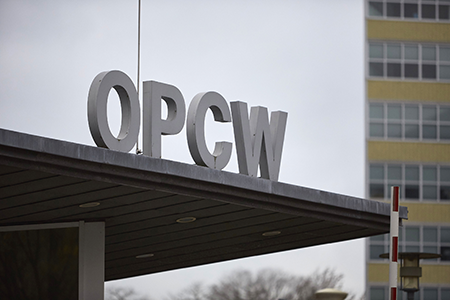"[Arms Control Today] has become indispensable! I think it is the combination of the critical period we are in and the quality of the product. I found myself reading the May issue from cover to cover."
OPCW Visits Ukraine on Chemical Weapons Allegations
September 2024
By Mina Rozei
The Organisation for the Prohibition of Chemical Weapons (OPCW) conducted its first technical assistance visit in Ukraine on July 2-3 as a response to months of alleged illegal chemical weapons use by Ukraine and Russia. (See ACT, June 2024.)

Ukraine requested the visit after the country signed an ad hoc privileges and immunities agreement with the OPCW on May 24. As part of the agreement, OPCW experts delivered 70 devices that detect gas and vapor threats and conducted training on how to use them for 20 experts from the Ukrainian State Emergency Service, including first responders.
After long accusing Russia of using chemical weapons since launching its full-scale invasion of Ukraine in 2022, Kyiv provided evidence for its claim at the OPCW Executive Council meeting July 9-12 in The Hague. In a report to the council, Ukraine alleged that Russia used various weapons containing hazardous chemical agents more than 3,000 times between February 2023 and June 2024.
The documentation offered, including evidence prepared by the Ukrainian armed forces commander, contained photos and detailed analysis of the types of munitions found on the battlefield, alleging that “most of the munitions (82 percent) used were hand gas grenades of the K-51 and RG-VO types…which are riot control agents and are prohibited for use as means of warfare” under the Chemical Weapons Convention (CWC).
Riot control agents are permitted in certain circumstances by the CWC, but are prohibited under Article 1 when used “as a method of warfare.”
Ukraine warned that the lack of international response to Russia’s unlawful weapons use means that the risk of recurrence is increasing. It said that there would be follow-up to the OPCW July visit to Ukraine, with “more such activities…scheduled throughout the year.”
It is unknown whether this report will provide the necessary “specific substantiated request” required of at least one CWC state-party for the OPCW to formally begin any OPCW activities related to the use of chemical weapons.
The issue is expected to be raised at the next CWC conference of states-parties in The Hague on Nov. 25-29. Nicole Shampaine, U.S. ambassador to the OPCW, told Arms Control Today that the United States “will join many other countries in ensuring this issue is at the top of the agenda at the OPCW in order to hold Russia accountable for its actions.”
The technical assistance visit came after the OPCW issued a statement May 7 that it is monitoring the situation in Ukraine and open to requests from member states for formal investigations. Both Ukraine and Russia have made allegations of chemical weapons use on the battlefield, reflecting the struggles to ensure CWC compliance that have dogged the OPCW since the beginning of the Syrian crisis in 2012.
“The norm against the possession or use of chemical weapons embodied in the [CWC] is being challenged due to repeated violations by a small number of countries,” Bonnie Jenkins, the U.S. undersecretary of state for arms control and international security, told Arms Control Today.
